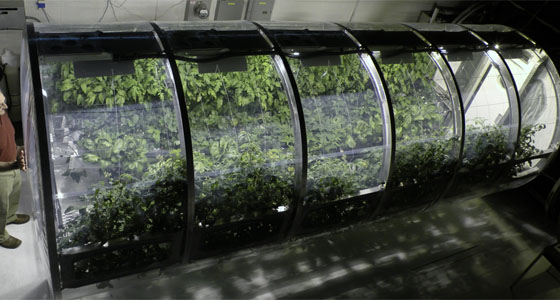  
The Prototype Mars-Lunar Greenhouse (M-LGH)
More at: https://cals.arizona.edu/lunargreenhouse/

The M-LGH is equipped as a Bioregenerative Life Support System (BLSS) through the design and construction of an innovative hydroponic plant growth chamber. Centered on using plants to sustain a continuous vegetarian diet for astronauts, a typical BLSS employs plants and crop production in addition for food, to also provide air revitalization, water recycling, and waste recycling for the crew. Fulfilling the requirement of NASA's GES and the late Mr. Steckler's dream of space colonization, the M-LGH aims to deliver more than supporting a sustained human presence in space. The M-LGH aspires to bring practical commerical-ready technology to Earth's CEA forefront.
|

